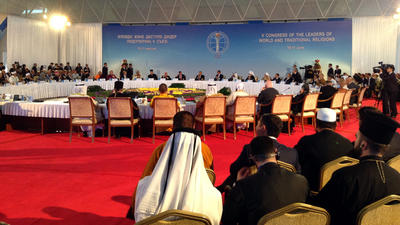-
Our work
-
Fields of work
- Arms control
- Border management
- Combating trafficking in human beings
- Conflict prevention and resolution
- Countering terrorism
- Cyber/ICT Security
- Democratization
- Economic activities
- Education
- Elections
- Environmental activities
- Gender equality
- Good governance
- Human rights
- Media freedom and development
- Migration
- National minority issues
- Policing
- Reform and co-operation in the security sector
- Roma and Sinti
- Rule of law
- Tolerance and non-discrimination
- Youth
- Field operations
- Projects
-
Meetings and conferences
- Summit meetings
- Review Conferences
- Ministerial Council meetings
- Plenary meetings of the Permanent Council
- Plenary Meetings of the Forum for Security Co-operation
- Security Review Conferences
- Annual Implementation Assessment Meetings
- Economic and Environmental Forum
- Economic and Environmental Dimension Implementation Meetings
- Human rights meetings
- Media conferences
- Cyber/ICT security conferences
- Conference of the Alliance against Trafficking in Persons
- Gender equality conferences
- Annual OSCE Mediterranean conferences
- Annual OSCE Asian conferences
- Partnerships
-
Fields of work
-
Countries
- All
-
Participating States
- Albania
- Andorra
- Armenia
- Austria
- Azerbaijan
- Belgium
- Belarus
- Bosnia and Herzegovina
- Bulgaria
- Canada
- Croatia
- Cyprus
- Czechia
- Denmark
- Estonia
- Finland
- France
- Georgia
- Germany
- Greece
- Holy See
- Hungary
- Iceland
- Ireland
- Italy
- Kazakhstan
- Kyrgyzstan
- Latvia
- Liechtenstein
- Lithuania
- Luxembourg
- Malta
- Moldova
- Monaco
- Mongolia
- Montenegro
- The Netherlands
- North Macedonia
- Norway
- Poland
- Portugal
- Romania
- Russian Federation
- San Marino
- Serbia
- Slovakia
- Slovenia
- Spain
- Sweden
- Switzerland – OSCE Chairpersonship 2026
- Tajikistan
- Türkiye
- Turkmenistan
- Ukraine
- United Kingdom
- United States of America
- Uzbekistan
- Asian Partners for Co-operation
- Mediterranean Partners for Co-operation
-
Structures and institutions
- Chairpersonship
-
Secretariat
- Secretary General
- Office of the Secretary General
- Conflict Prevention Centre
- Transnational Threats Department
- Office of the Special Representative and Co-ordinator for Combating Trafficking in Human Beings
- Office of the Co-ordinator of OSCE Economic and Environmental Activities
- Gender Issues Programme
- Opportunities for Youth
- Department of Human Resources
- Department of Management and Finance
- Office of Internal Oversight
- Documentation Centre in Prague
- Institutions
-
Field operations
- Presence in Albania
- Centre in Ashgabat
- Programme Office in Astana
- Programme Office in Bishkek
- Mission to Bosnia and Herzegovina
- Programme Office in Dushanbe
- Mission in Kosovo
- Mission to Moldova
- Mission to Montenegro
- Mission to Serbia
- Mission to Skopje
- Project Co-ordinator in Uzbekistan
- Closed field activities
- Parliamentary Assembly
- Court of Conciliation and Arbitration
- Organizational structure
- About us
Press release
OSCE Secretary General promotes inter-faith dialogue to prevent radicalization at Congress of Leaders of World and Traditional Religions in Kazakhstan

- Date:
- Place:
- ASTANA
- Source:
- OSCE Secretary General
- Fields of work:
- Tolerance and non-discrimination
ASTANA, 11 June 2015 – OSCE Secretary General Lamberto Zannier visited Astana on 10-11 June to participate in the 5th Congress of Leaders of World and Traditional Religions and to hold bilateral meetings with Kazakhstan’s Chairman of the Senate, Kassym-Jomart Tokayev, and Foreign Minister Erlan Idrissov.
Speaking at the Congress of Leaders of World and Traditional Religions, Zannier said, “A forum like this provides an excellent occasion to rally around our shared goal of peace, development and security for all.”
Emphasizing that religion was not a root cause of violent extremism, he said that it was incorrect to blame any particular religion for acts of violence carried out in its name.
Zannier highlighted the important contribution that religious leaders can make to preventing radicalization and violent extremism. “Religious leaders can play a positive role in taking up the concerns of those most vulnerable in our societies, especially young people, who may be tempted by extremist ideologies,” he said. “Addressing their material and also spiritual needs more effectively can help strengthen their identity and sense of belonging, which could help to prevent their marginalization and possible radicalization.”
He also pointed out that media can be effective tools for promoting counter-narratives and messages of tolerance, and for connecting all those who are working to advance mutual understanding and dialogue.
Highlighting efforts by OSCE institutions in promoting tolerance and non-discrimination, Zannier pointed in particular to the work of the OSCE Office for Democratic Institutions and Human Rights, which has developed tools to promote dialogue about religious tolerance and non-discrimination. “Inter-faith dialogue has been on the OSCE agenda for many years and is an integral part of the Organization’s efforts to promote tolerance and non-discrimination.”
Political and religious dignitaries from 42 countries took part in the conference, including United Nations Secretary General Ban Ki-moon and Jordan’s King Abdullah II.